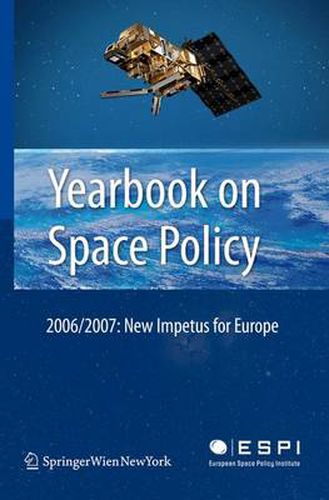Readings Newsletter
Become a Readings Member to make your shopping experience even easier.
Sign in or sign up for free!
You’re not far away from qualifying for FREE standard shipping within Australia
You’ve qualified for FREE standard shipping within Australia
The cart is loading…






This title is printed to order. This book may have been self-published. If so, we cannot guarantee the quality of the content. In the main most books will have gone through the editing process however some may not. We therefore suggest that you be aware of this before ordering this book. If in doubt check either the author or publisher’s details as we are unable to accept any returns unless they are faulty. Please contact us if you have any questions.
Spacepolicyisanissueareaofparticularstrategicrelevance. Itreceivesaconstantly growingattentionbynationalgovernmentsandtheEuropeanUnion. Ittouches numerousimportantareaslikesecurity,science,technology,knowledge,infor- tion,mobility,environmentorresourcemanagement,tonameonlyafew. Through this,spacepolicydrawsfrombutalsodrivesthemostdecisiveaspectsofmodern society. Anillustrationforthisstatementcanbegivenwithabrieflookonrecent developmentsinspacepolicy. InparticulartheadoptionoftheEuropeanSpace PolicyinMay2007,whichhadbeenjointlypreparedbytheEuropeanSpaceAgency andtheEuropeanCommission,doeshaveatremendousimpactonareasbene?ting fromspaceapplications,likeclimateresearch,disastermanagementorresource management. TheEuropeanSpacePolicywillalsopushareaslikenavigationor telecommunications,whichareattheheartoftheknowledgesocietyandtheme- issueofmobility. Atthesametime,securityinallitsfacetsisgrowinglydependingon theuseofspacecapabilitiesandspacepolicymakinghasstartedtore?ectthis. Onthe globallevel,theinitiativesforroboticandhumanspaceexplorationgainmoreand moreprominenceandwithactorslikeChina,arenaissanceofspaceasastrategictool forinternationalprestigeandin?uencecanbeobserved. Thecharacterofspacepolicyandthedynamisminthis?eldanditsrelatedareas makeitappropriateandevennecessarytosurveythis?eldonacontinuousbasiswith ahighstandard. ThisreasoningwasthebasisfortheinitiativebytheEuropeanSpace PolicyInstitute(ESPI)topreparetheYearbookonSpacePolicy. TheYearbookis intended to become the reference publication for the analysis of space policy developments. ThescopeisglobalbuttheperspectiveisEuropean. Thiscoincides withESPI?smissiontobethefocalpointforEuropeanresearchinthe?eldofspace policyasprovidedforbythedecisionoftheCounciloftheEuropeanSpaceAgency tofoundESPI. Asathinktank,ESPIhastoprovideinformationandanalysisandto contributefacilitating the decision-making process. The Yearbook isaimed to becomea?agshipinESPI?sproductlineapproachingthisgoal. Theaspirationis thattheYearbookonSpacePolicymaygainthestatureofcomparableyearbooksin internationalrelationsbyleadingthinktanksaroundtheworld. TheYearbookonSpacePolicyhasanumberofspeci?cfeatures. Thereporting periodwillusuallybefromJulytoJune,leadingtoitspublicationinthebeginningof thefollowingyear. Forthis?rstedition,thereportingperiodwassettostartearlier (from1January2006)butstopatthetypicaldate(30June2007). Thisservesthe purposetocoverthewholeyear2006. TheYearbookwillhavethreeparts. The?rst partispreparedbyESPIandprovidesasystematicanalysisofthemainspace v Preface activitiesintheglobalpoliticalcontext. Itcontainsapresentationofthemajor developmentsinspacepolicies,programmesandtechnologiesaroundtheworld. In thesecondpart,usuallyaroundtenprominentresearcherscontributearticlesto speci?ctopicsofparticularrelevance. Inthiseditiontheyarerelatedtoinitiativesand decisionsinEuropeanspacepolicies -asindicatedinthisyear?smottoofthe Yearbook-Spacepolicyisanissueareaofparticularstrategicrelevance. Itreceivesaconstantly growingattentionbynationalgovernmentsandtheEuropeanUnion. Ittouches numerousimportantareaslikesecurity,science,technology,knowledge,infor- tion,mobility,environmentorresourcemanagement,tonameonlyafew. Through this,spacepolicydrawsfrombutalsodrivesthemostdecisiveaspectsofmodern society. Anillustrationforthisstatementcanbegivenwithabrieflookonrecent developmentsinspacepolicy. InparticulartheadoptionoftheEuropeanSpace PolicyinMay2007,whichhadbeenjointlypreparedbytheEuropeanSpaceAgency andtheEuropeanCommission,doeshaveatremendousimpactonareasbene?ting fromspaceapplications,likeclimateresearch,disastermanagementorresource management. TheEuropeanSpacePolicywillalsopushareaslikenavigationor telecommunications,whichareattheheartoftheknowledgesocietyandtheme- issueofmobility. Atthesametime,securityinallitsfacetsisgrowinglydependingon theuseofspacecapabilitiesandspacepolicymakinghasstartedtore?ectthis. Onthe globallevel,theinitiativesforroboticandhumanspaceexplorationgainmoreand moreprominenceandwithactorslikeChina,arenaissanceofspaceasastrategictool forinternationalprestigeandin?uencecanbeobserved. Thecharacterofspacepolicyandthedynamisminthis?eldanditsrelatedareas makeitappropriateandevennecessarytosurveythis?eldonacontinuousbasiswith ahighstandard. ThisreasoningwasthebasisfortheinitiativebytheEuropeanSpace PolicyInstitute(ESPI)topreparetheYearbookonSpacePolicy. TheYearbookis intended to become the reference publication for the analysis of space policy developments. ThescopeisglobalbuttheperspectiveisEuropean. Thiscoincides withESPI?smissiontobethefocalpointforEuropeanresearchinthe?eldofspace policyasprovidedforbythedecisionoftheCounciloftheEuropeanSpaceAgency tofoundESPI. Asathinktank,ESPIhastoprovideinformationandanalysisandto contributefacilitating the decision-making process. The Yearbook isaimed to becomea?agshipinESPI? sproductlineapproachingthisgoal. Theaspirationis thattheYearbookonSpacePolicymaygainthestatureofcomparableyearbooksin internationalrelationsbyleadingthinktanksaroundtheworld. TheYearbookonSpacePolicyhasanumberofspeci?cfeatures. Thereporting periodwillusuallybefromJulytoJune,leadingtoitspublicationinthebeginningof thefollowingyear. Forthis?rstedition,thereportingperiodwassettostartearlier (from1January2006)butstopatthetypicaldate(30June2007). Thisservesthe purposetocoverthewholeyear2006. TheYearbookwillhavethreeparts. The?rst partispreparedbyESPIandprovidesasystematicanalysisofthemainspace v Preface activitiesintheglobalpoliticalcontext. Itcontainsapresentationofthemajor developmentsinspacepolicies,programmesandtechnologiesaroundtheworld. In thesecondpart,usuallyaroundtenprominentresearcherscontributearticlesto speci?ctopicsofparticularrelevance. Inthiseditiontheyarerelatedtoinitiativesand decisionsinEuropeanspacepolicies -asindicatedinthisyear?smottoofthe Yearbook-butalsoglobalissuesliketherecentChineseantisatellitetestorthenew Japanesespaceregulation. ThethirdpartoftheYearbook,againpreparedbyESPI, contains a unique compilation of important facts and ?gures. It includes achronology,anoverviewonspaceactivitiesinselectedcountriesandabibliography. TheprojectofacomprehensiveYearbookrequiresthecooperationofthewhole community. ThisiswhyESPI?sworkforthispublicationiscomplementedbythe contributionsofexternalauthorsprovidingtheirexceptionalinsightsandexperiences. ThesecontributorsfromalloverEuropearetheleadingacademicexpertsmainlybased inthinktanksanduniversityinstituteswhilesomearealsoassociatedwithspace agenciesorworkinindustryorresearchanddevelopment. Theyarepartofthe EuropeanSpacePolicyResearchandAcademicNetwork(ESPRAN)coordinatedby ESPI. ItisimportanttomentionthatalsoexpertsfromoutsideEuropecanbepartof thisnetwork. ThisishighlightedbythecontributionofJohnLogsdon(George WashingtonUniversity,WashingtonDC),oneofthedoyensinspacepolicyresearch. InvolvedinthisendeavourisalsoanEditorialAdvisoryBoard,composedofthe membersofESPI?sAdvisoryCouncil. Allthisaimsatsecuringtheacademicqualityof theYearbookanditsaimtobecomearelevantsourceofinformationandanalysis. AnimportantelementofthesuccessofsuchaninitiativelikethisYearbookisthe mediumofitspresentation. ESPIisextremelypleasedthatSpringerWienNewYork wasfromtheoutsetverymuchinterestedinthisproject. Throughtheexcellent collaborationwithSpringer?sSilviaSchilgeriusthechallengesofa?rsteditionfor suchaYearbookseriesweremasteredwithgreatease. CooperationbetweenESPI andSpringerWienNewYorkisintendedtointensifyfurtherwithadedicatedbook seriesonspacepolicy. TheseperspectiveswereadditionalmotivationforESPI?s editorialteamforthis?rsteditionoftheYearbook,whereNicolasPeterauthored Part1,CharlotteMathieueditedPart2andCharlotteMathieuandBlandina BaranespreparedPart3. Valuablecontributionsandsupportwereprovidedinthe earlyplanningphasebySergePlattardandintheeditorialphasebyPierre-Henri Pisani,JulieAbouYehiaandTimSkurbaty. Itiswithgreatcon?dencethatwebring this Yearbook to the attention of decision makers, professionals in industry, researchandsciencedealingwithspaceactivitiesandinternationalrelationsand alsotothebroaderpublic,whichintendstounderstandthepoliciesbehindoneof themostimportantandfascinatingprovincesofmodernsociety:space! Kai-UweSchrogl,CharlotteMathieu,NicolasPeter ESPIeditorialteam vi Tableofcontents Tableofcontents Listofacronyms…xiv Listof?guresandtables …xxii PART1 TheYearinSpace2006/2007 Chapter1. Europeanspaceactivitiesintheglobal context. NicolasPeter 1. Geopoliticaltrends …2 1. 1. Globaleconomicoutlook …2 1. 2. Politicaldevelopmentsin2006/2007…3 1. 2. 1. Europe …3 1. 2. 2. UnitedStates…4 1. 2. 3. Russia…5 1. 2. 4. Japan…5 1. 2. 5. China…6 1. 2. 6. India…7 1. 3. Internationalsecurity…7 1. 4. Majorhighlightsinscienti?cactivitiesandresearch …8 1. 5. Mainscienceandtechnologyindicators relevanttospace activities…11 1. 5. 1. Scienceandtechnologyinputs …11 1. 5. 2. Scienceandtechnologyoutputs…13 2. Worldwidespacepoliciesandstrategies …16 2. 1. TheUnitedNationssystem…16 2. 1. 1. UnitedNationsGeneralAssemblycommittees…18 2. 1. 2. OtherUnitedNationsbodiesandorgans…
$9.00 standard shipping within Australia
FREE standard shipping within Australia for orders over $100.00
Express & International shipping calculated at checkout
This title is printed to order. This book may have been self-published. If so, we cannot guarantee the quality of the content. In the main most books will have gone through the editing process however some may not. We therefore suggest that you be aware of this before ordering this book. If in doubt check either the author or publisher’s details as we are unable to accept any returns unless they are faulty. Please contact us if you have any questions.
Spacepolicyisanissueareaofparticularstrategicrelevance. Itreceivesaconstantly growingattentionbynationalgovernmentsandtheEuropeanUnion. Ittouches numerousimportantareaslikesecurity,science,technology,knowledge,infor- tion,mobility,environmentorresourcemanagement,tonameonlyafew. Through this,spacepolicydrawsfrombutalsodrivesthemostdecisiveaspectsofmodern society. Anillustrationforthisstatementcanbegivenwithabrieflookonrecent developmentsinspacepolicy. InparticulartheadoptionoftheEuropeanSpace PolicyinMay2007,whichhadbeenjointlypreparedbytheEuropeanSpaceAgency andtheEuropeanCommission,doeshaveatremendousimpactonareasbene?ting fromspaceapplications,likeclimateresearch,disastermanagementorresource management. TheEuropeanSpacePolicywillalsopushareaslikenavigationor telecommunications,whichareattheheartoftheknowledgesocietyandtheme- issueofmobility. Atthesametime,securityinallitsfacetsisgrowinglydependingon theuseofspacecapabilitiesandspacepolicymakinghasstartedtore?ectthis. Onthe globallevel,theinitiativesforroboticandhumanspaceexplorationgainmoreand moreprominenceandwithactorslikeChina,arenaissanceofspaceasastrategictool forinternationalprestigeandin?uencecanbeobserved. Thecharacterofspacepolicyandthedynamisminthis?eldanditsrelatedareas makeitappropriateandevennecessarytosurveythis?eldonacontinuousbasiswith ahighstandard. ThisreasoningwasthebasisfortheinitiativebytheEuropeanSpace PolicyInstitute(ESPI)topreparetheYearbookonSpacePolicy. TheYearbookis intended to become the reference publication for the analysis of space policy developments. ThescopeisglobalbuttheperspectiveisEuropean. Thiscoincides withESPI?smissiontobethefocalpointforEuropeanresearchinthe?eldofspace policyasprovidedforbythedecisionoftheCounciloftheEuropeanSpaceAgency tofoundESPI. Asathinktank,ESPIhastoprovideinformationandanalysisandto contributefacilitating the decision-making process. The Yearbook isaimed to becomea?agshipinESPI?sproductlineapproachingthisgoal. Theaspirationis thattheYearbookonSpacePolicymaygainthestatureofcomparableyearbooksin internationalrelationsbyleadingthinktanksaroundtheworld. TheYearbookonSpacePolicyhasanumberofspeci?cfeatures. Thereporting periodwillusuallybefromJulytoJune,leadingtoitspublicationinthebeginningof thefollowingyear. Forthis?rstedition,thereportingperiodwassettostartearlier (from1January2006)butstopatthetypicaldate(30June2007). Thisservesthe purposetocoverthewholeyear2006. TheYearbookwillhavethreeparts. The?rst partispreparedbyESPIandprovidesasystematicanalysisofthemainspace v Preface activitiesintheglobalpoliticalcontext. Itcontainsapresentationofthemajor developmentsinspacepolicies,programmesandtechnologiesaroundtheworld. In thesecondpart,usuallyaroundtenprominentresearcherscontributearticlesto speci?ctopicsofparticularrelevance. Inthiseditiontheyarerelatedtoinitiativesand decisionsinEuropeanspacepolicies -asindicatedinthisyear?smottoofthe Yearbook-Spacepolicyisanissueareaofparticularstrategicrelevance. Itreceivesaconstantly growingattentionbynationalgovernmentsandtheEuropeanUnion. Ittouches numerousimportantareaslikesecurity,science,technology,knowledge,infor- tion,mobility,environmentorresourcemanagement,tonameonlyafew. Through this,spacepolicydrawsfrombutalsodrivesthemostdecisiveaspectsofmodern society. Anillustrationforthisstatementcanbegivenwithabrieflookonrecent developmentsinspacepolicy. InparticulartheadoptionoftheEuropeanSpace PolicyinMay2007,whichhadbeenjointlypreparedbytheEuropeanSpaceAgency andtheEuropeanCommission,doeshaveatremendousimpactonareasbene?ting fromspaceapplications,likeclimateresearch,disastermanagementorresource management. TheEuropeanSpacePolicywillalsopushareaslikenavigationor telecommunications,whichareattheheartoftheknowledgesocietyandtheme- issueofmobility. Atthesametime,securityinallitsfacetsisgrowinglydependingon theuseofspacecapabilitiesandspacepolicymakinghasstartedtore?ectthis. Onthe globallevel,theinitiativesforroboticandhumanspaceexplorationgainmoreand moreprominenceandwithactorslikeChina,arenaissanceofspaceasastrategictool forinternationalprestigeandin?uencecanbeobserved. Thecharacterofspacepolicyandthedynamisminthis?eldanditsrelatedareas makeitappropriateandevennecessarytosurveythis?eldonacontinuousbasiswith ahighstandard. ThisreasoningwasthebasisfortheinitiativebytheEuropeanSpace PolicyInstitute(ESPI)topreparetheYearbookonSpacePolicy. TheYearbookis intended to become the reference publication for the analysis of space policy developments. ThescopeisglobalbuttheperspectiveisEuropean. Thiscoincides withESPI?smissiontobethefocalpointforEuropeanresearchinthe?eldofspace policyasprovidedforbythedecisionoftheCounciloftheEuropeanSpaceAgency tofoundESPI. Asathinktank,ESPIhastoprovideinformationandanalysisandto contributefacilitating the decision-making process. The Yearbook isaimed to becomea?agshipinESPI? sproductlineapproachingthisgoal. Theaspirationis thattheYearbookonSpacePolicymaygainthestatureofcomparableyearbooksin internationalrelationsbyleadingthinktanksaroundtheworld. TheYearbookonSpacePolicyhasanumberofspeci?cfeatures. Thereporting periodwillusuallybefromJulytoJune,leadingtoitspublicationinthebeginningof thefollowingyear. Forthis?rstedition,thereportingperiodwassettostartearlier (from1January2006)butstopatthetypicaldate(30June2007). Thisservesthe purposetocoverthewholeyear2006. TheYearbookwillhavethreeparts. The?rst partispreparedbyESPIandprovidesasystematicanalysisofthemainspace v Preface activitiesintheglobalpoliticalcontext. Itcontainsapresentationofthemajor developmentsinspacepolicies,programmesandtechnologiesaroundtheworld. In thesecondpart,usuallyaroundtenprominentresearcherscontributearticlesto speci?ctopicsofparticularrelevance. Inthiseditiontheyarerelatedtoinitiativesand decisionsinEuropeanspacepolicies -asindicatedinthisyear?smottoofthe Yearbook-butalsoglobalissuesliketherecentChineseantisatellitetestorthenew Japanesespaceregulation. ThethirdpartoftheYearbook,againpreparedbyESPI, contains a unique compilation of important facts and ?gures. It includes achronology,anoverviewonspaceactivitiesinselectedcountriesandabibliography. TheprojectofacomprehensiveYearbookrequiresthecooperationofthewhole community. ThisiswhyESPI?sworkforthispublicationiscomplementedbythe contributionsofexternalauthorsprovidingtheirexceptionalinsightsandexperiences. ThesecontributorsfromalloverEuropearetheleadingacademicexpertsmainlybased inthinktanksanduniversityinstituteswhilesomearealsoassociatedwithspace agenciesorworkinindustryorresearchanddevelopment. Theyarepartofthe EuropeanSpacePolicyResearchandAcademicNetwork(ESPRAN)coordinatedby ESPI. ItisimportanttomentionthatalsoexpertsfromoutsideEuropecanbepartof thisnetwork. ThisishighlightedbythecontributionofJohnLogsdon(George WashingtonUniversity,WashingtonDC),oneofthedoyensinspacepolicyresearch. InvolvedinthisendeavourisalsoanEditorialAdvisoryBoard,composedofthe membersofESPI?sAdvisoryCouncil. Allthisaimsatsecuringtheacademicqualityof theYearbookanditsaimtobecomearelevantsourceofinformationandanalysis. AnimportantelementofthesuccessofsuchaninitiativelikethisYearbookisthe mediumofitspresentation. ESPIisextremelypleasedthatSpringerWienNewYork wasfromtheoutsetverymuchinterestedinthisproject. Throughtheexcellent collaborationwithSpringer?sSilviaSchilgeriusthechallengesofa?rsteditionfor suchaYearbookseriesweremasteredwithgreatease. CooperationbetweenESPI andSpringerWienNewYorkisintendedtointensifyfurtherwithadedicatedbook seriesonspacepolicy. TheseperspectiveswereadditionalmotivationforESPI?s editorialteamforthis?rsteditionoftheYearbook,whereNicolasPeterauthored Part1,CharlotteMathieueditedPart2andCharlotteMathieuandBlandina BaranespreparedPart3. Valuablecontributionsandsupportwereprovidedinthe earlyplanningphasebySergePlattardandintheeditorialphasebyPierre-Henri Pisani,JulieAbouYehiaandTimSkurbaty. Itiswithgreatcon?dencethatwebring this Yearbook to the attention of decision makers, professionals in industry, researchandsciencedealingwithspaceactivitiesandinternationalrelationsand alsotothebroaderpublic,whichintendstounderstandthepoliciesbehindoneof themostimportantandfascinatingprovincesofmodernsociety:space! Kai-UweSchrogl,CharlotteMathieu,NicolasPeter ESPIeditorialteam vi Tableofcontents Tableofcontents Listofacronyms…xiv Listof?guresandtables …xxii PART1 TheYearinSpace2006/2007 Chapter1. Europeanspaceactivitiesintheglobal context. NicolasPeter 1. Geopoliticaltrends …2 1. 1. Globaleconomicoutlook …2 1. 2. Politicaldevelopmentsin2006/2007…3 1. 2. 1. Europe …3 1. 2. 2. UnitedStates…4 1. 2. 3. Russia…5 1. 2. 4. Japan…5 1. 2. 5. China…6 1. 2. 6. India…7 1. 3. Internationalsecurity…7 1. 4. Majorhighlightsinscienti?cactivitiesandresearch …8 1. 5. Mainscienceandtechnologyindicators relevanttospace activities…11 1. 5. 1. Scienceandtechnologyinputs …11 1. 5. 2. Scienceandtechnologyoutputs…13 2. Worldwidespacepoliciesandstrategies …16 2. 1. TheUnitedNationssystem…16 2. 1. 1. UnitedNationsGeneralAssemblycommittees…18 2. 1. 2. OtherUnitedNationsbodiesandorgans…